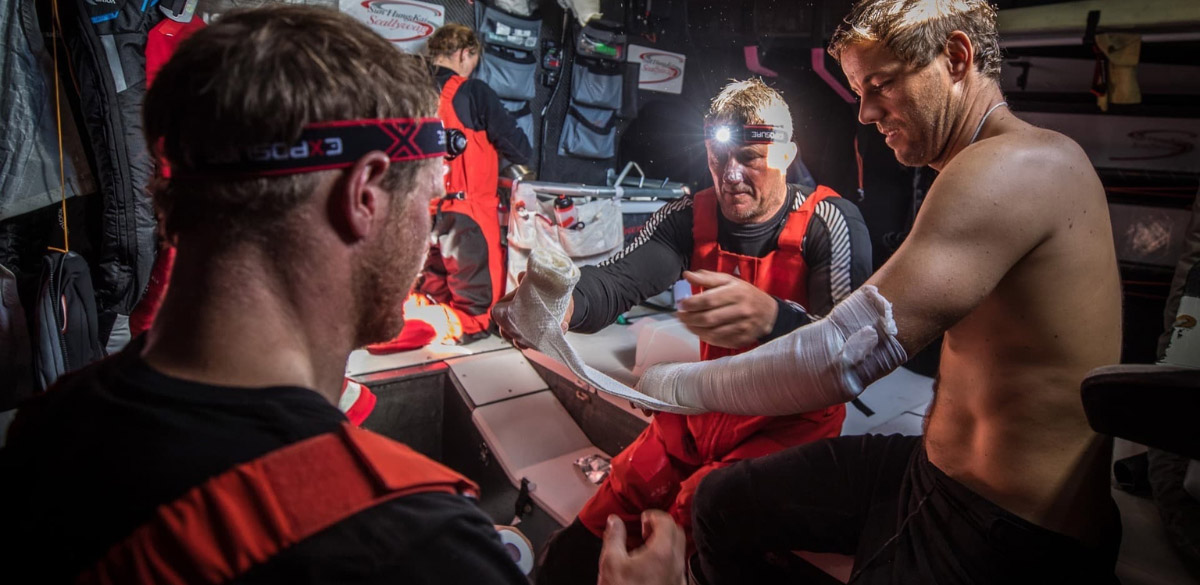As a prior yacht nurse and current MSOS yacht medical trainer, I have always thought that a captain of a vessel being required to take full charge of all medical care onboard is a very difficult requirement.
A doctor will have 7-15 years of continuous training, a nurse or paramedic 3-7 years, and then years of daily real patient experience, ensuring training has turned into excellent medical skills.
Training is knowledge, experience is wisdom as they say.
A captain will have a 4.5-day course repeated every 5 years, a few good medical drills in between, maybe annual training with a professional yacht medical trainer, and hopefully no actual real patient experience onboard…
This is not to say that with a cool head and well-trained crew support, a captain cannot deal with most straightforward medical issues onboard competently.
But the IMO does state the following
‘In the absence of a doctor on board (which is most often the case), the captain is responsible for medical care. However, any medical training he has received is not such as to allow him to treat a patient unaided. That is why telemedical advice may enable him to provide a good standard of treatment and make the best use of the compulsory medicine chest’
They follow up with the following statement on telemedical support (TMAS)
‘The overall objective of a system of medical assistance at sea is to try to provide seafarers with medical care as nearly as possible equivalent to the care they would receive ashore’
‘MEDICAL ASSISTANCE AT SEA’ INTERNATIONAL MARITIME ORGANIZATION (IMO) MSC/Circ.960 20 June 2000
When getting someone to shore is a few hours or days away, a good maritime doctor at the end of the phone via a TMAS service is vital to a good outcome, and speedy recovery.
Here are a few ways your telemedical support service can help you and your crew
Prevention
As an example when cruising the tropics, early symptoms of dengue fever in a crew member are minor and can look like a flu or gastrointestinal bug, however on day 3-7 after contracting dengue, severe dengue can occur, which is unsurvivable at sea.
A call to your TMAS for an assessment of a crew member’s fitness to go to sea will help to prevent avoidable harm and the need to provide complex medical care, or worst case, a death at sea.
Assessment
A good TMAS service will cover both physical and mental health in one service, a call for a review of a crew member with some behavioural changes could be life-saving, and provide a good plan of action on how to best support that crew member.
Safety
The strong medications in the maritime medical kits can, if given in a few mls of the wrong dose, be fatal. A TMAS service provides recommendations that take into account allergies, the patient’s normal medications, and the signs and symptoms to determine whether to administer medications, and if so, in the correct dose and at the right time, minimizing risk.
Harm
All medications and treatments can have severe side effects.
For example, some antibiotics can cause changes to the skin’s surface, which, if one is working on deck, can result in severe sunburn.
TMAS doctors can determine the safest option or combination of treatments based on the patient’s profile during a medical incident and provide information on how to take the medications safely while managing any side effects that may occur.
Privacy
A TMAS service will ensure continuous documentation of the case, recording all calls and providing a case report for medical services if required. This ensures secure patient data and better care through thorough record-keeping.
Logistics
A maritime TMAS team will have links with worldwide support services and can assist a captain in organising a rescue, whether that be to another vessel, a heli-vac service, or advise to keep the patient onboard and reroute to a better medical facility. An assessment by a TMAS doctor can also identify patients who appear well but have less obvious conditions, such as a detached retina, which requires urgent evacuation despite the patient appearing to walk and talk normally.
What you can do to support the TMAS doctor
- Speak clearly and slowly when calling, move away from noise, and ensure you can hear and be heard accurately. This might mean moving to another room away from the medical incident and not using speakerphone.
- Know your medical kit inside and out. The better you understand the location and use of the equipment, the quicker the patient will receive treatment.
- Make pre-season, pre-arranged drill calls to build confidence among all crew members using the TMAS service.
At MSOS, all our doctors are consultant-level professionals with many years of experience in telemedical support, giving them the unique skill of making decisive treatment plans for patients without seeing or touching them in person – a challenging task!Our doctors are also selected for their unique maritime experience and knowledge, giving them a deep understanding of common injuries and illnesses at sea, and the complications of providing medical care on a moving vessel with limited space.
























0 Comments